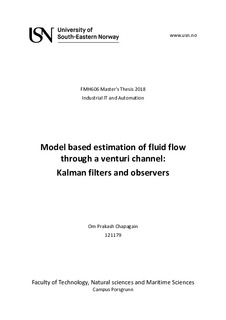Model based estimation of fluid flow through a venturi channel: Kalman filters and observers
Master thesis
Permanent lenke
http://hdl.handle.net/11250/2564654Utgivelsesdato
2018Metadata
Vis full innførselSamlinger
Sammendrag
In oil drilling operation, the estimation of returning flow is vital for safe operation. The
return flow gives an early warning of kick-loss phenomenon. Detecting kick-loss is
important to prevent uncontrolled well-blowout. The estimated slow of the returning fluid is a primary indicator of a kick or a loss. The existing methods for flow estimation anglebased paddle sensor or Coriolis flow meter. These methods are either unreliable or too expensive.
The aim of this thesis work is to investigate other reliable flow estimation methods.
Therefore, dynamic model-based flow estimation technique is proposed here. Using
dynamic model, suitable estimators such as Luenberger observer and Kalman filters can be designed. Such technique reduces the operational and maintenance costs of using expensive flow measuring mechanical devices such as Coriolis flow meters.
A model of top-side open venturi channel is developed as a set of St. Venant equations for one spatial dimension which are a class of quasi-linear hyperbolic partial differential equations (PDEs). These PDEs are reduced to a set of nonlinear first order ordinary differential equation (ODEs) using orthogonal collocation methods and Lagrange interpolating polynomials. The nonlinear ODEs are linearized around a suitable operating point. Based on the linear ODEs, linear Luenberger full order state observer as well as linear Kalman filter (LKF) is designed. For designing nonlinear Kalman filters such as extended Kalman filter (EKF) and unscented Kalman filter (UKF), nonlinear ODEs are used.
Different types of state estimators are applied to model and real system. UKF outperforms all other estimators investigated during this thesis work. UKF converges faster and is more robust. It is able to filter out the noise. The error between the estimated flow rates and the measured flow rates is minimized. However, a proper tuning of process and measurement noise covariance matrices is necessary for UKF to provide optimal state estimation.
For increased accuracy in flow estimation, an improved version of the ODEs are
recommended. PDE-observers are recommended for further improvement in the flow
estimation. Based on the results of this thesis work, the future of model based flow estimation technique in oil industry looks promising.
